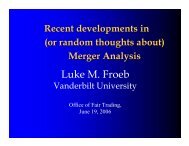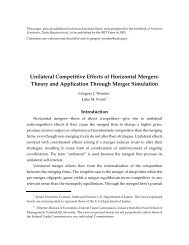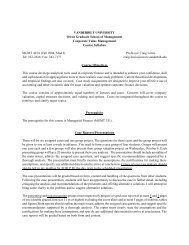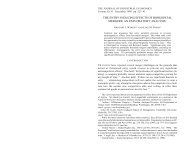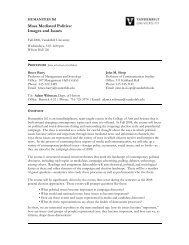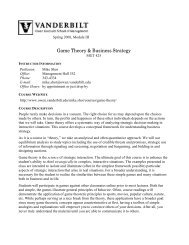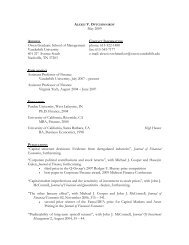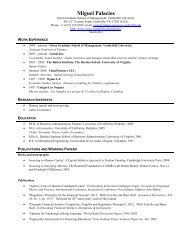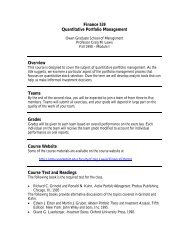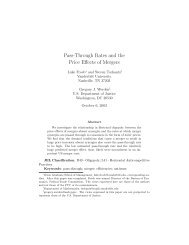course syllabus - Vanderbilt Business School - The Owen Graduate ...
course syllabus - Vanderbilt Business School - The Owen Graduate ...
course syllabus - Vanderbilt Business School - The Owen Graduate ...
Create successful ePaper yourself
Turn your PDF publications into a flip-book with our unique Google optimized e-Paper software.
<strong>Owen</strong> <strong>Graduate</strong> <strong>School</strong> of Management<br />
<strong>Vanderbilt</strong> University<br />
Fall 2006, Module 2<br />
Tues./Thurs., 11:20 am - 12:50 pm<br />
MGT. 443<br />
POWER AND INFLUENCE IN ORGANIZATIONS<br />
(Rev. 16‐Oct‐06)<br />
Professor:<br />
Bruce Barry<br />
Office: 307 Management Hall<br />
Voice/Fax: 322-3489 / 343-7177<br />
Email: bruce.barry@vanderbilt.edu<br />
Office hours:<br />
by appointment<br />
OVERVIEW<br />
This <strong>course</strong> is a multidisciplinary overview of the issues of power, influence, conflict, and<br />
dissent in and out of work organizations. We will draw on multiple perspectives to explore how<br />
power and influence are gained, maintained, used, abused, and lost in the pursuit of social<br />
objectives. <strong>The</strong> goal is to strike a balance--both in readings and in class discussions--between<br />
theoretical perspectives and applications. Applications of power and influence will also be<br />
drawn from cases, guest speakers, video excerpts, and your own experiences. <strong>The</strong> <strong>course</strong> will<br />
be managed as a graduate seminar, with heavy emphasis on classroom discussion of readings,<br />
cases, and issues. I intend to use my power to influence students to attend regularly and<br />
participate actively.<br />
SOURCES FOR READINGS<br />
Readings are drawn from these materials available at the <strong>Vanderbilt</strong> Bookstore:<br />
· R.B. Cialdini, Influence: Science and Practice (4 th ed). Allyn and Bacon, 2001.<br />
· S.D. Alinsky, Rules for Radicals. Vintage, 1971<br />
· A ClassPak of required readings.<br />
And:<br />
· Online readings linkable through <strong>course</strong> web page (see below).<br />
COURSE WEB PAGE<br />
A Web page for the <strong>course</strong>, http://www2.owen.vanderbilt.edu/bruce.barry/mgt443/, contains<br />
a day-by-day <strong>course</strong> outline and a downloadable version of this <strong>syllabus</strong>. Many of the readings<br />
for this <strong>course</strong> are online, with links to them appearing on the Web page. Unless otherwise<br />
indicated, online readings are required readings. I may also add new links to relevant articles<br />
or destinations as we go along.
-2-<br />
COURSE REQUIREMENTS/GRADES<br />
• Class Participation (45% of <strong>course</strong> grade)<br />
Much of the value of the <strong>course</strong> follows from exposure to the ideas and insights of others, both<br />
in readings and in class discussion. For this reason I put substantial weight in grading on inclass<br />
participation. It is essential that you come to class prepared to share your own ideas and<br />
insights about the readings and the subject under discussion. <strong>The</strong> quality of your class<br />
participation is more important than quantity, although some of the latter is necessary to<br />
gauge the former. Good contributions to class discussion are perceptive, relevant, and focused<br />
-- they respond to the current flow of the discussion, and enhance it.<br />
If you are not comfortable making a commitment to read assigned materials, attend class, and<br />
participate actively, then you should consider finding another elective.<br />
• Everything Else (55% of <strong>course</strong> grade)<br />
In the spirit of the theme of the <strong>course</strong>, I am empowering you to make choices about how you<br />
wish to meet the requirements that will comprise the 55% of your grade that is not based on<br />
class participation. Starting on page 4 I list a collection of written deliverables of varying form<br />
and grade-weight. In some cases there are even options within a single deliverable for<br />
different weights depending on how you tackle the assignment.<br />
Your obligation is to undertake and complete some combination of deliverables of your own<br />
choosing that sums to 55% in weight. You can elect any combination you like. <strong>The</strong>re are only<br />
two rules:<br />
[1] No ex post facto substitutions: A deliverable, once turned in, will count toward your<br />
grade. You may not opt later (e.g., after seeing a grade) to pile on extra deliverables<br />
in order to cancel out earlier deliverables.<br />
[2] Almost everything is negotiable: You may propose alternative deliverables or<br />
alterations to the scope (and, accordingly, the grade weight) of existing deliverables in<br />
order to tailor <strong>course</strong> requirements to your interests, whims, and desires. I must agree<br />
to such proposals before you turn in a novel or modified deliverable. Only two things<br />
are not negotiable: the 45% weight for class participation, and the prohibition on<br />
substitutions in rule #1.<br />
Descriptions of the eligible deliverables begin on page 4, organized into three categories<br />
(brief, medium-length, and project-length).<br />
► An at-a-glance summary of possible deliverables in chart form is provided in<br />
an Appendix on the last page of the <strong>syllabus</strong>.<br />
CRITERIA FOR EVALUATING WRITTEN WORK IN THIS COURSE<br />
<strong>The</strong> papers you write for this class, like other forms of written communication produced by<br />
managers, should be precise, organized, logical, and appropriately supported. (But: incident<br />
papers and reaction papers can also have a reflective flavor.) I look for the following when I<br />
read your papers:
-3-<br />
· Your analysis should be thesis-driven, which is to say it should be perfectly clear to the<br />
reader what argumentative point you are making. Arguments should be justified using<br />
relevant readings and other class materials. References should be explicit and<br />
appropriately cited.<br />
· Your analysis should be specific, with the rationale behind positions taken or refuted<br />
clear and unmistakeable. Minimize the possibility that the reader will think "I wonder<br />
why he/she thinks this..." Don't assume anything on the part of the reader.<br />
· Incorporate the implications of your analysis. Go beyond the obvious to consider<br />
relevant tradeoffs in any <strong>course</strong> of action. What if your assumptions are wrong?<br />
· Value the quality of your own ideas. Bring in your own creative thinking when possible.<br />
Avoid transparent, simplistic attempts to glue concepts onto applications.<br />
· Pay attention to style. Papers should be thoughtfully organized, with main points<br />
clear, and the flow of argument easy to discern. Errors of spelling, grammar, and<br />
syntax are inexcusable. Turn in a clean, clear, readable paper. Please.<br />
POWER, INFLUENCE, AND THE HONOR CODE<br />
Students are bound by the Honor Code for all work completed in this <strong>course</strong>. Specifically:<br />
· For individual assignments, the work you turn should be entirely your own completed<br />
without the assistance of others.<br />
· Assignments identified as group work are to be completed by only members of the<br />
group, and it is expected all members of the group will have contributed. Your name<br />
on a group deliverable indicates that you have contributed your share, and that all<br />
others whose names appear on it have contributed theirs.<br />
· Written work must use appropriate citations in some consistent format to signify when<br />
arguments or analyses rely on the ideas or insights of others (including classpak<br />
readings).<br />
· It is your responsibility to understand what plagiarism is, and what it means to properly<br />
cite the work of others. Plagiarism also occurs if you submit uncredited material that<br />
was used by you or someone else in a prior version of this or another <strong>course</strong> at<br />
<strong>Vanderbilt</strong>.<br />
· Any use of analyses or any other material in any format from other sections of this<br />
<strong>course</strong> or a similar <strong>course</strong> taught at any time in the past, at <strong>Vanderbilt</strong>, other<br />
universities, or the Internet, is a violation of the Honor Code. This includes the use of<br />
materials in multiple classes without consent of the instructors.
-4-<br />
• BRIEF DELIVERABLES •<br />
(these are all individual endeavors)<br />
Option: Incident Essay<br />
Weight: 15%<br />
Length: ~1250 words<br />
Due: Friday, Nov. 3 (end of week 3)<br />
Identify and describe a compelling example of the use of political power in organizations, either based<br />
on your own personal experiences, on incidents you have witnessed, or on events that have happened<br />
to people you know. Regardless of source, the events you describe must be based on fact and firsthand<br />
knowledge. Describe the incident; then, drawing on concepts covered in the <strong>course</strong>, explain and<br />
interpret how power and influence were involved, and discuss whether the incident was avoidable or<br />
should have been handled differently.<br />
Option: Reaction Paper<br />
Weight: 10% for brief form; 15% for expanded form<br />
Length:
-5-<br />
Option: Case Brief<br />
Weight: 5%<br />
Length: ~500 words<br />
Due: in class on the day of case discussion<br />
Write a brief (a single-spaced page or so) analysis of the issues raised in the <strong>syllabus</strong> study questions for<br />
any of following cases. Use <strong>course</strong> concepts to justify your reasoning. You may do up to two of these.<br />
· “Launching the War on Terrorism” (due in class on October 31)<br />
· “Matt Leeds” (due in class on November 7)<br />
· “Will She Fit In?” (due in class on November 9)<br />
· “<strong>The</strong> Best of Intentions” (due in class on November 14)<br />
· “A Blogger in <strong>The</strong>ir Midst” (due in class on November 16)<br />
· “Gilman Roberts” (due in class on November 28)<br />
• MEDIUM-LENGTH DELIVERABLES •<br />
(mixture of individual and group endeavors -- see specifics below)<br />
Option: Film Festival Paper<br />
Weight: 15% if done in a group (maximum size=3)<br />
20% if done individually<br />
Length: ~2000 words<br />
Due: Friday, Nov. 17 (end of week 5)<br />
Rent, watch, and write about one or more feature-length films as case studies in power and influence<br />
within and/or between organizations. Your review essay should do more than simply chronicle the use<br />
of power and influence. An excellent paper will adopt some analytic theme, such as<br />
comparing/contrasting multiple films, or perhaps assessing how power and influence are portrayed in<br />
relation to the context of relevant real-life situations, or providing an in-depth treatment of a<br />
particular character, or pursuing some other theme.<br />
Here is a list of possible films from which to choose:<br />
Mr. Smith Goes to Washington (1939)<br />
All the King’s Men (1949)<br />
Executive Suite (1954)<br />
Bridge on the River Kwai (1957)<br />
<strong>The</strong> Manchurian Candidate (1962)<br />
King Rat (1965)<br />
<strong>The</strong> Candidate (1972)<br />
All the President’s Men (1976)<br />
Norma Rae (1979)<br />
Marie (1985)<br />
American Dream (1990)<br />
Bob Roberts (1992)<br />
Barbarians at the Gate (1993)<br />
Six Degrees of Separation (1993)<br />
<strong>The</strong> War Room (1993)<br />
City Hall (1996)<br />
Gattaca (1997)<br />
Wag the Dog (1997)<br />
Primary Colors (1998)<br />
Bulworth (1998)<br />
Talented Mr. Ripley (1999)<br />
Election (1999)<br />
With a Friend Like Harry (2000)<br />
<strong>The</strong> Contender (2000)<br />
State and Main (2000)<br />
<strong>Business</strong> of Strangers (2001)<br />
Minority Report (2002)<br />
Adaptation (2002)<br />
<strong>The</strong> Cooler (2003)<br />
Control Room (2004)<br />
Eternal Sunshine…Mind (2004)<br />
Napoleon Dynamite (2004)<br />
Crash (2004)<br />
Hitchhikers Guide…Galaxy (2005)<br />
Enron:Smartest Guys…Room (2005)<br />
Thank you for Smoking (2005)<br />
<strong>The</strong> Road to Guantanamo (2006)<br />
<strong>The</strong> Devil Wears Prada (2006)<br />
Jindabyne (2006)<br />
Many other films are possible; please clear films not on this list with me in advance. For more<br />
information and these or just about any other film (plot summaries, reviews, cast information, etc.),<br />
consult the exhaustive Internet Movie Database at http://www.imdb.com/.
-6-<br />
Option: Influence Professional Analysis<br />
Weight: 15% if done in a group (maximum size=3)<br />
20% if done individually<br />
Length: ~2000 words<br />
Due: Friday, Dec. 1 (end of week 6)<br />
<strong>The</strong> objective of this project is to experience how “influence professionals” do what they do. You will<br />
accomplish this by placing yourself in situations that allow you to observe or experience the actions of<br />
one or more influence professionals. Your tangible goal is to write a paper that analyzes the use of<br />
influence tactics within the setting or settings you choose.<br />
I am quite flexible on the contours of this assignment:<br />
Two rules:<br />
· You can focus on a single type of influence professional, or for that matter a single individual,<br />
or alternatively you can compare/contrast more than one individual or type.<br />
· You can gather data by placing yourself in a position to be influenced by the influence<br />
professional under study, or by watching them do their thing on others, or perhaps by<br />
interviewing the professional under study. Ideally, you will undertake some combination of<br />
these.<br />
· <strong>The</strong> term “influence professional” can be construed rather broadly, although the burden is on<br />
you to convince the reader that the person(s) under study is in some sense an influence<br />
professional. Check with me beforehand if you are not sure.<br />
[1] <strong>The</strong> “data” must be “primary” – based on first-hand contact and observation.<br />
[2] Be an ethical anthropologist: Although unobtrusive participant-observation is okay, avoid<br />
deliberately misrepresenting yourself to your subject, or otherwise directly misleading anyone<br />
regarding the nature of your involvement in their universe.<br />
• PROJECT-LENGTH DELIVERABLES •<br />
(these are group endeavors; maximum group size=4)<br />
Option: Powerlessness Project<br />
Weight: 25%<br />
Length: ~3000 words<br />
Due: last day of class (December 7)<br />
<strong>The</strong> focus of this project is on "powerlessness." I want you to investigate and analyze the conditions of<br />
powerlessness associated with a real, functioning group that is "disadvantaged" or in some way<br />
struggling against the currents of power. Your paper should describe the group you select, recap the<br />
methodology of your investigation, analyze the target group's goals and structure, and develop<br />
strategies for that group to gain power and improve their conditions.<br />
Here are some guidelines to help you select a target group to study:
-7-<br />
· <strong>The</strong> decision as to whether or not a group qualifies as "powerless" is yours, not mine.<br />
In fact, power and powerlessness are relative constructs, and part of your job here is<br />
to come to grips with your own model of power and apply it to the organization you<br />
choose to study.<br />
· Select an identifiable, formal group or organization, not just a demographic or<br />
otherwise distinct category of people (for example, choose the Association for Left-<br />
Handed Individuals, not just simply "humans who are left-handed."<br />
Proposal Requirement: If you are doing this project, you must submit a brief proposal that: (a)<br />
identifies the students in your group, (b) describes the target organization to be studied, (c) briefly<br />
justifies your rationale for studying this group and (d) gives a hint of your expectations about what you<br />
will find. Proposals are due on Friday, November 3 (end of week 3).<br />
Option: Some Other Project<br />
Weight: 25%<br />
Length: ~3000 words<br />
Due: last day of class (December 7)<br />
I invite you to propose any other project-length deliverable that you think is appropriate and relevant<br />
to the subject matter of the <strong>course</strong>, and suitably challenging to justify assigning it 25% of the <strong>course</strong><br />
grade. Here are some possibilities:<br />
· Create a Harvard-like case study (real or invented) of an organization, subunit, or individual<br />
that focuses on power, political, and/or influence dynamics. This entails writing both the case<br />
and an analysis of it. Consult me for details and examples.<br />
· Write a research paper profiling and analyzing some notable current or historical figure or<br />
event that entails prominent dynamics of power, politics, and/or influence.<br />
· Develop an influence campaign to accomplish some social or political objective.<br />
Proposal Requirement: I would like to know in advance the nature of any project you decide to<br />
undertake. Please submit a brief proposal that: (a) identifies the students in your group, (b) describes<br />
the project’s scope and objectives, and (c) outlines your methods and/or research sources. Proposals<br />
are due on Friday, November 3 (end of week 3).<br />
• An at-a-glance summary of possible deliverables in chart form is provided in<br />
an appendix on the last page of the <strong>syllabus</strong>.
-8-<br />
CLASS SCHEDULE AND ASSIGNMENTS<br />
WEEK 1<br />
Oct. 17<br />
Course Introduction<br />
ONLINE:<br />
· On the Uses of a Liberal Education<br />
· <strong>The</strong> <strong>Business</strong> of <strong>Business</strong> (<strong>School</strong>s)<br />
BOOK: · Alinsky, Rules for Radicals, pp. 3-23<br />
Oct. 19<br />
Models of Power<br />
CASE:<br />
What a Star-What a Jerk (Classpak #1). Case questions:<br />
- What, if anything, is Andy’s problem?<br />
- What, if anything, should Jane do about Andy?<br />
CLASSPAK:<br />
Power and Influence: Achieving Your Objectives in<br />
Organizations (Classpak #2)<br />
BOOK: Cialdini, Influence, Chapter 1<br />
WEEK 2<br />
Oct. 24<br />
<strong>The</strong> Yin of Social Influence<br />
BOOKS: · Cialdini, Influence, Chapters 2, 3, 4<br />
· Alinsky, Rules for Radicals, pp. 24-80<br />
Oct. 26<br />
<strong>The</strong> Yang of Social Influence<br />
BOOKS: · Cialdini, Influence, Chapters 5, 6, 7<br />
· Alinsky, Rules for Radicals, pp. 81-164<br />
SEE ALSO ONLINE READING
-9-<br />
WEEK 3<br />
Oct. 31<br />
Influence in Crisis Decision Making<br />
CASE: Launching the War on Terrorism (Classpak #3).<br />
Case questions:<br />
- Evaluate the president’s initial response to the<br />
attacks. How did his early actions affect the<br />
subsequent decision-making process?<br />
- What is your evaluation of the president’s<br />
leadership of the war cabinet’s decision process?<br />
What would you advise him to do differently in<br />
leading decision-making processes with advisors?<br />
SEE ALSO ONLINE READINGS<br />
Nov. 2<br />
<strong>The</strong> <strong>Business</strong> of Political Influence<br />
SPEAKER:<br />
Bill Fletcher, Political Media Consultant,<br />
Fletcher Rowley Chao Riddle Inc.<br />
READINGS ARE ONLINE (PLUS LINK TO SPEAKER’S WEBSITE)<br />
WEEK 4<br />
Nov. 7<br />
Cultivating (In)effective Relationships<br />
CASE:<br />
Matt Leeds (Classpak #4). Case questions:<br />
- How did Matt Leeds get into this mess?<br />
- What should he do now?<br />
SEE ALSO ONLINE READINGS<br />
Nov. 9<br />
<strong>The</strong> Politics of Sex and Gender<br />
CASE:<br />
Will She Fit In? (Classpak #5). Case questions:<br />
- What should Susan Carter do about the incident?<br />
- What issues underlie Susan’s decision about how (if<br />
at all) to respond/react to the incident?<br />
SEE ALSO ONLINE READINGS
-10-<br />
WEEK 5<br />
Nov. 14<br />
<strong>The</strong> Politics of Race<br />
CASE: <strong>The</strong> Best of Intentions (Classpak #6).<br />
Case questions:<br />
- What issues are the involved in this dilemma?<br />
- Should Cynthia give Steve the assignment?<br />
- Should Steve accept the job if offered?<br />
SEE ALSO ONLINE READINGS<br />
Nov. 16<br />
Free Speech<br />
CASE: A Blogger in their Midst (Classpak #7).<br />
Case questions:<br />
- What are Glove Girl’s sources of power?<br />
- What should Will Somerset do about Glove Girl?<br />
SEE ALSO ONLINE READINGS<br />
WEEK 6<br />
Nov. 28<br />
Power, Ethics, and Media<br />
CASE:<br />
Gilman Roberts (available online). Case questions:<br />
- Diagnose the power and influence dynamics<br />
associated with the principal actors in the case.<br />
Who has power, and who doesn’t?<br />
- As the case ends, Roberts is struggling with<br />
Michaels’s unwillingness to come clean, and more<br />
bad news may be coming out. What should Roberts<br />
do now? What are his options? Constraints?<br />
SEE ALSO ONLINE READINGS
-11-<br />
Nov. 30<br />
Corporate Power and Influence<br />
CLASSPAK: Assault of the Corporate Libertarians (Classpak #8)<br />
FILM:<br />
excerpts from <strong>The</strong> Corporation (we’ll view in class)<br />
SEE ALSO ONLINE READINGS<br />
WEEK 7<br />
Dec. 5<br />
Markets and Inequality<br />
READINGS ARE ONLINE<br />
Dec. 7<br />
Rights Within and Beyond the Workplace<br />
READINGS ARE ONLINE
-12-<br />
Mgt. 443<br />
Fall 2006, Mod 2<br />
SUMMARY OF DELIVERABLES<br />
(complete a combination that sums to 55%)<br />
BRIEF DELIVERABLES (INDIVIDUAL)<br />
Option Weight Length* Due You Can Do<br />
Incident Essay 15% 1250 words Nov. 3 1<br />
Reaction Paper (brief) 10% 1000 words 1-week after<br />
Reaction Paper (expanded) 15% 1500 words 1-week after<br />
2<br />
(any combo)<br />
Deviant-for-a-Day Paper 15% 1250 words anytime 1<br />
Case Brief 5% 500 words day of case 2<br />
MEDIUM-LENGTH DELIVERABLES<br />
Option Weight Length* Due You Can Do<br />
Film Festival Paper – Group 15% 2000 words Nov. 17<br />
1<br />
Film Festival Paper - Individual 20% 2000 words Nov. 17 film paper<br />
Influence Professional - Group 15% 2000 words Dec. 1<br />
1<br />
Influence Professional - Individual 20% 2000 words Dec. 1 i-prof. paper<br />
PROJECT-LENGTH DELIVERABLES<br />
Option Weight Length* Due You Can Do<br />
Group Powerlessness Project 25% 3000 words Dec. 7<br />
1<br />
Some Other Group Project 25% 3000 words Dec. 7 project<br />
Keep in mind the two rules:<br />
[1] No ex post facto substitutions: A deliverable, once turned in, will count toward your<br />
grade. You may not pile on extra deliverables in order to cancel out earlier<br />
deliverables.<br />
[2] Almost everything is negotiable: You may propose alternative deliverables or<br />
alterations to the scope and grade weight of existing deliverables. I must agree to such<br />
proposals before you turn in a novel or modified deliverable.<br />
* Regarding length: word counts are approximations, not hard and fast limits. It is okay to be a bit over<br />
or under. A double-spaced page of 12-point type with one-inch margins all around comes it at roughly<br />
250 words (depending on how big the words you use are). In Microsoft Word, you can always check the<br />
word count of a document by opening the Tools menu, and clicking on Word Count.



